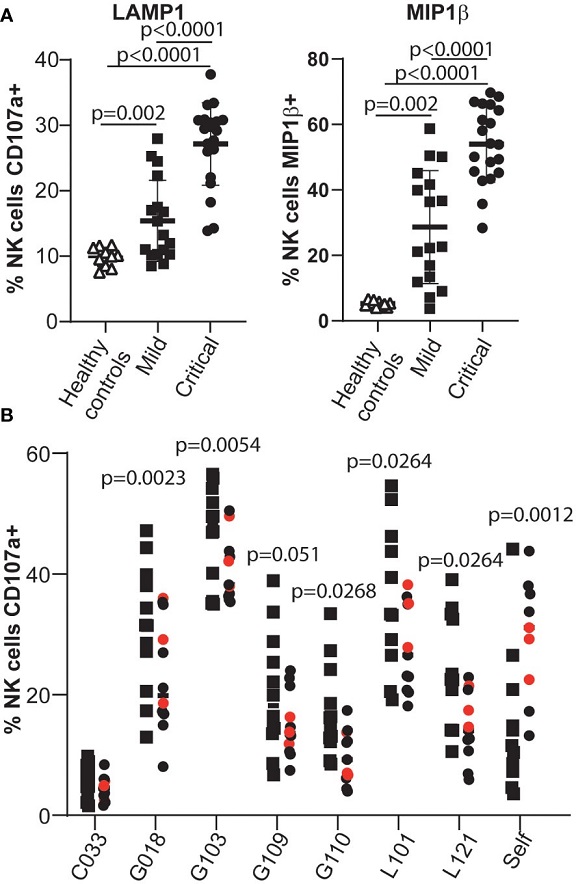Increased Concentrations Of Cell-Free NKG2D-Ligands Impair The Functionality Of NK Cells In Severe Cases Of COVID-19
Nikhil Prasad Fact checked by:Thailand Medical News Team Feb 13, 2024 1 year, 1 month, 1 week, 6 days, 2 hours, 3 minutes ago
COVID-19 News: The global battle against the Severe acute respiratory syndrome coronavirus 2 (SARS-CoV-2) has exposed the intricate interplay between the virus and the human immune system. While some individuals experience mild or asymptomatic infections, others face life-threatening COVID-19 disease. The immune response, particularly that of Natural Killer (NK) cells, emerges as a critical determinant in this divergence. A new study conducted by the National Centre for Biotechnology in Spain that is covered in this
COVID-19 News report, sheds light on the relationship between NK cells, NKG2D-ligands, and the severity of COVID-19.
 NK cells from patients critically ill with COVID-19 disease are less effective mediators of ADCC than NK cells from patients with mild disease. (A) Serum samples from healthy individuals collected pre-pandemia, SARS-CoV-2 infected individuals with mild disease and SARS-CoV-2 infected individuals with life-threatening disease were tested in ADCC assays using PBMC samples from healthy controls. The NK cell response was assayed by measuring degranulation and MIP1β production. (B) The ADCC response mediated by NK cells in PBMCs obtained from mild/asymptomatic cases (squares) or from critically ill patients (circles) was assayed using selected serum samples. Samples from patients who died due to COVID-19 disease are coloured red. Statistical significance was assessed using two-tailed Mann-Whitney tests and p values are indicated.
Understanding the Immune Landscape in COVID-19
NK cells from patients critically ill with COVID-19 disease are less effective mediators of ADCC than NK cells from patients with mild disease. (A) Serum samples from healthy individuals collected pre-pandemia, SARS-CoV-2 infected individuals with mild disease and SARS-CoV-2 infected individuals with life-threatening disease were tested in ADCC assays using PBMC samples from healthy controls. The NK cell response was assayed by measuring degranulation and MIP1β production. (B) The ADCC response mediated by NK cells in PBMCs obtained from mild/asymptomatic cases (squares) or from critically ill patients (circles) was assayed using selected serum samples. Samples from patients who died due to COVID-19 disease are coloured red. Statistical significance was assessed using two-tailed Mann-Whitney tests and p values are indicated.
Understanding the Immune Landscape in COVID-19
COVID-19 severity is not solely dictated by age or pre-existing health conditions. Immunopathogenic responses, including cytokine storms, contribute significantly to multi-organ failure and mortality. Investigating the immune responses, particularly NK cells, offers insights into the delicate balance between viral clearance and immunopathogenicity.
NK cells are innate effector lymphocytes crucial for combating ongoing viral infections. They eliminate virus-infected cells through various mechanisms, including direct cytotoxicity, cytokine/chemokine secretion, and crosstalk with other immune cells. Previous studies hinted at both protective and pathogenic roles of NK cells in SARS-CoV-2 immunity, creating a puzzle in understanding their exact contribution.
Analyzing NK Cells in COVID-19 Patients
The research focused on comparing NK cells in individuals with mild/asymptomatic and life-threatening COVID-19. The study revealed that patients with severe disease displayed higher levels of adaptive NK cells and activated peripheral blood NK cells. However, a surprising finding was that these activated NK cells demonstrated reduced functionality, particularly in mediating Antibody-Dependent Cellular Cytotoxicity (ADCC).
The diminished ADCC capacity of NK cells in severe cases was associated with lower expression of the activating receptor NKG2D. Further investigation uncovered elevated levels of cell-free NKG2D ligands, specifically ULBP2 and ULBP3, in the plasma of critically ill patients. This observation pointed towards a potential correl
ation between NKG2D-ligands and compromised NK cell function in severe COVID-19.
Unraveling the Mechanisms Behind NK Cell Dysfunction
Mechanistically, the study explored whether changes in CD16 or the presence of TGFβ could explain the impaired ADCC function. Surprisingly, neither CD16 alterations nor significant differences in plasma TGFβ levels were observed between patients with mild and severe disease. Instead, the focus shifted to the presence of cell-free NKG2D ligands in the blood, which was found to contribute to reduced NK function, including ADCC, in severe COVID-19.
The study highlighted that exposure to patient sera containing cell-free NKG2D ligands led to a decrease in ADCC function in healthy donor NK cells. This effect could be partially reversed by the addition of NKG2D ligand-specific antibodies. The data strongly suggested that the presence of these ligands in the bloodstream contributes to the compromised NK cell function observed in severe cases.
Implications for Biomarker Development
Elevated levels of cell-free ULBP2/5/6 and ULBP3 in plasma from critically ill patients correlated with increased expression of these ligands in the lungs of severe cases. This finding raises the possibility of using soluble NKG2D ligand levels in plasma as a potential biomarker for severe disease. However, prospective studies are essential to establish the prognostic value of these ligands as reliable indicators of disease severity.
Limitations and Future Directions
The study acknowledges limitations, such as the absence of direct access to virus-infected tissues and the reliance on peripheral blood NK cells. Future analyses should encompass a broader spectrum of respiratory viruses to discern the specificity of the observed immune responses to SARS-CoV-2 infection. Additionally, exploring the dynamics of ligand release mechanisms and the potential role of shedding enzymes in NK cell dysfunction warrants further investigation.
Conclusion
In the intricate landscape of COVID-19 immunopathogenesis, NK cells emerge as pivotal players. The study from the National Centre for Biotechnology in Spain unravels the nuanced interplay between NK cells, NKG2D-ligands, and disease severity. The compromised function of NK cells in severe cases, linked to elevated levels of cell-free NKG2D ligands, provides valuable insights into potential therapeutic targets. As research continues, understanding the immune dysregulation in severe COVID-19 becomes crucial for devising effective strategies to navigate the complexities of viral infections and enhance patient outcomes.
The study findings were published in the peer reviewed journal: Frontiers in Immunology.
https://www.frontiersin.org/journals/immunology/articles/10.3389/fimmu.2024.1273942/full
For the latest
COVID-19 News, keep on logging to Thailand Medical News.
